16 Minutes
At Startup Fair 2025 in Vilnius, one of the most anticipated discussions brought together a group of leading investors from the UK, the Nordics, Asia, and Europe. The panel, titled “Money Talks: Global Trends You Can’t Ignore”, explored the forces shaping global investment, the rise of artificial intelligence as a new economic driver, and what these shifts mean for founders and investors across the Baltic region.
Participants
Moderator: Donatas Keras (Founding Partner at Practica Capital)
Panelists:
Jaewoong Choi (Executive Vice President at Woori Technology Investment)
Rebecka Lothman Ryda (General Manager at Norrsken Evolve)
Guy Ward Thomas (Partner at DN Capital)
Mehmet Atici (Managing Partner at Bek Ventures)
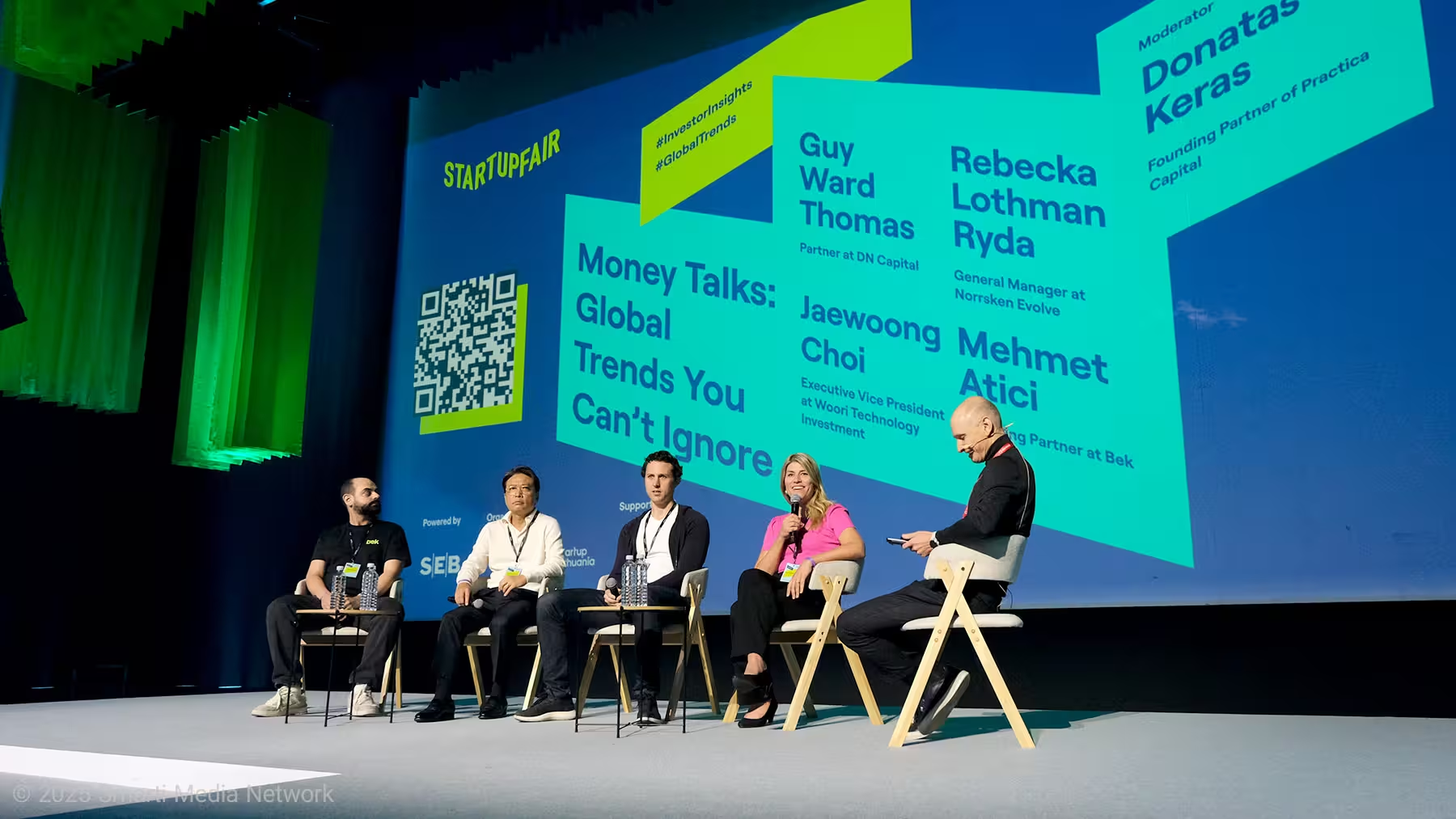
Setting the Stage
Opening the session, moderator Donatas Keras welcomed the audience and his guests on stage: Rebecka, Guy, Jaewoong, and Mehmet.
He introduced the theme: global investment trends that cannot be ignored, with artificial intelligence at the center of discussion.
Keras explained that the panel would have two layers. First, the group would focus on AI startups their growth, monetization, and how investors evaluate them. Second, they would take a broader, strategic look at AI’s role in transforming the global economy and the urgent need for investors to adapt their theses accordingly.
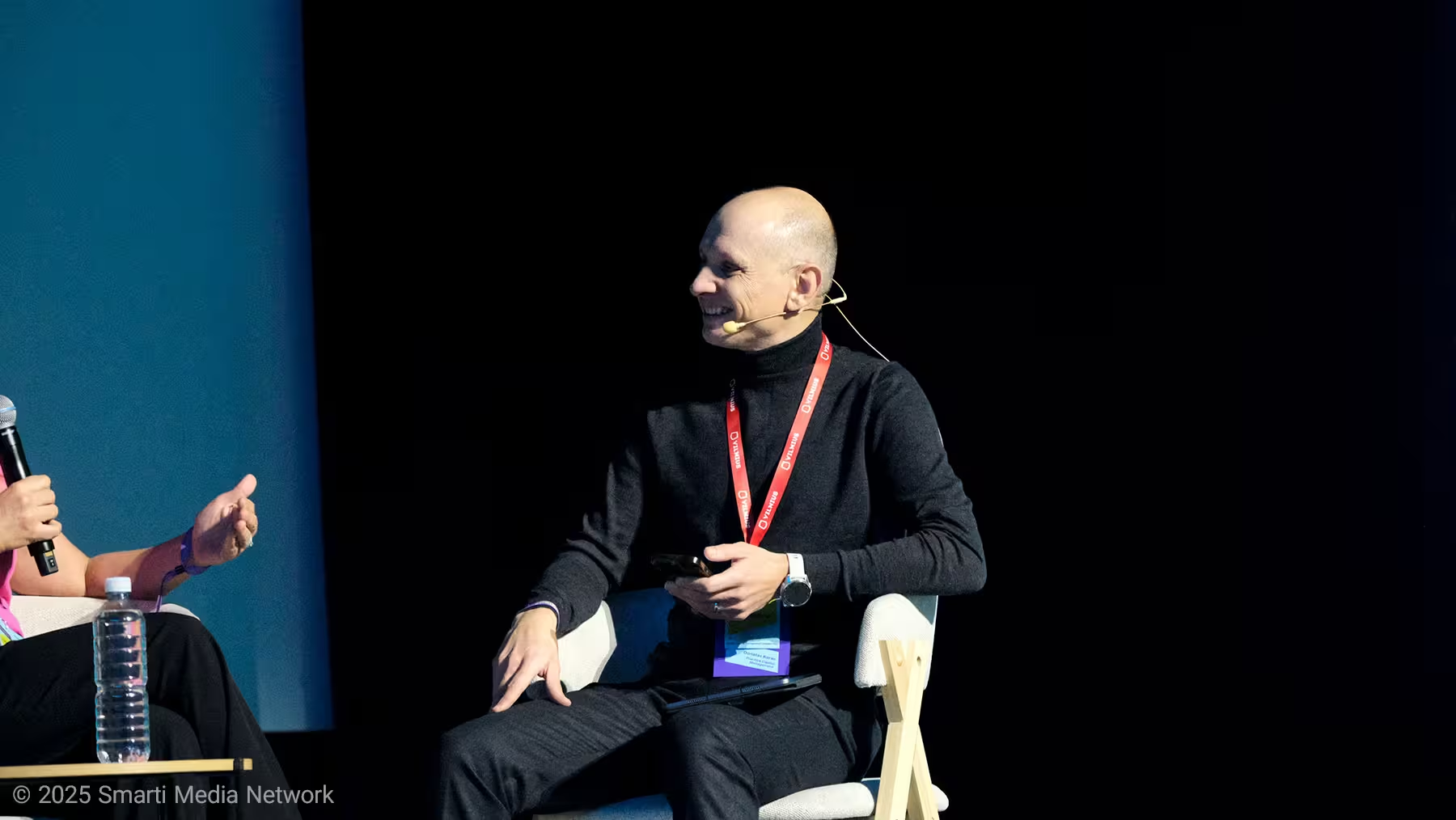
Introductions: Why Are You Here?
Rebecka Lothman Ryda began by introducing herself as one of the general partners at Norrsken Evolve. She said she was excited to be in Lithuania to invest in more Baltic founders, praising Lithuania’s rapidly growing startup scene.
“We just closed a new fund,” she added, smiling. “Lithuania is on fire almost overtaking Estonia in deal flow.”
Her fund focuses on pre-seed investments in sustainability and resilience, working hands-on with founders across Europe and helping them develop strong foundations at early stages.
Guy Ward Thomas, Partner at DN Capital, followed. “We’re a 25-year-old Series A-focused venture fund, investing in consumer and enterprise software,” he said. “Earlier this summer, we completed Europe’s largest-ever AI exit selling Cognigy to NICE Systems for a billion dollars.”
Laughing, he added, “Well, technically, one billion minus forty-five million but I like to round up on stage.” His reason for being in Vilnius: “I’m here to find the next Cognigy.”
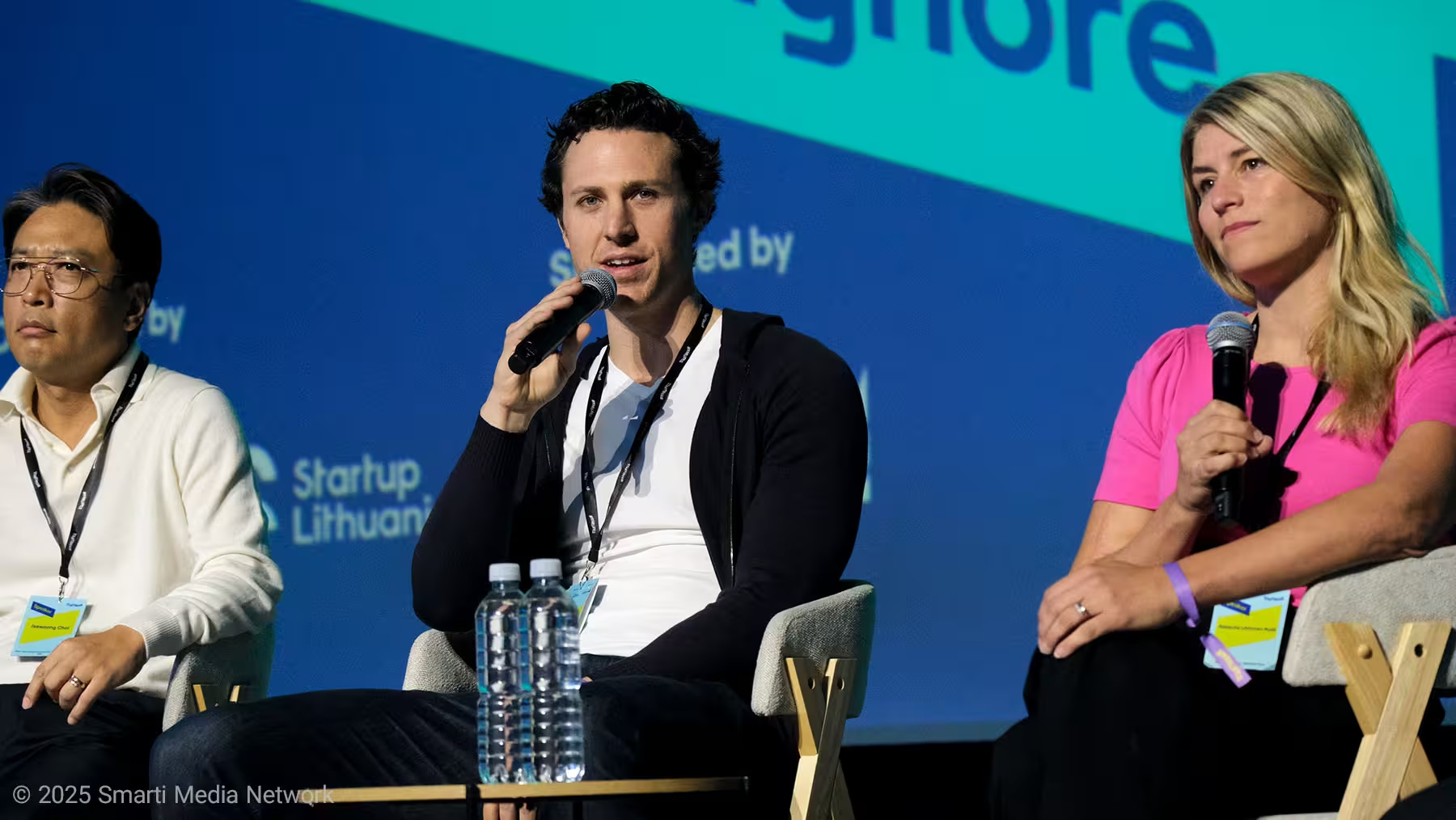
Jaewoong Choi, representing Woori Technology Investment of Korea, said his firm has been around for more than 30 years and is one of the largest venture capital firms in Korea. “The reason I’m here in Lithuania,” he said, “is to find more opportunities more global-standard startups that we can invest in. I’m really excited to be in Vilnius and to meet many of you.”
Mehmet Atici, Managing Partner at Bek Ventures, described his fund as a global early-stage venture firm investing in pre-seed, seed, and early AI. “We were recently named the best-performing VC firm of the last decade,” he noted modestly.
“We’ve been fortunate to back the first unicorns of several countries Romania, Turkey, Bulgaria and we’re big believers in new emerging hubs. I truly think Vilnius is a contender to create the next winner in deep tech and next-generation industries.”
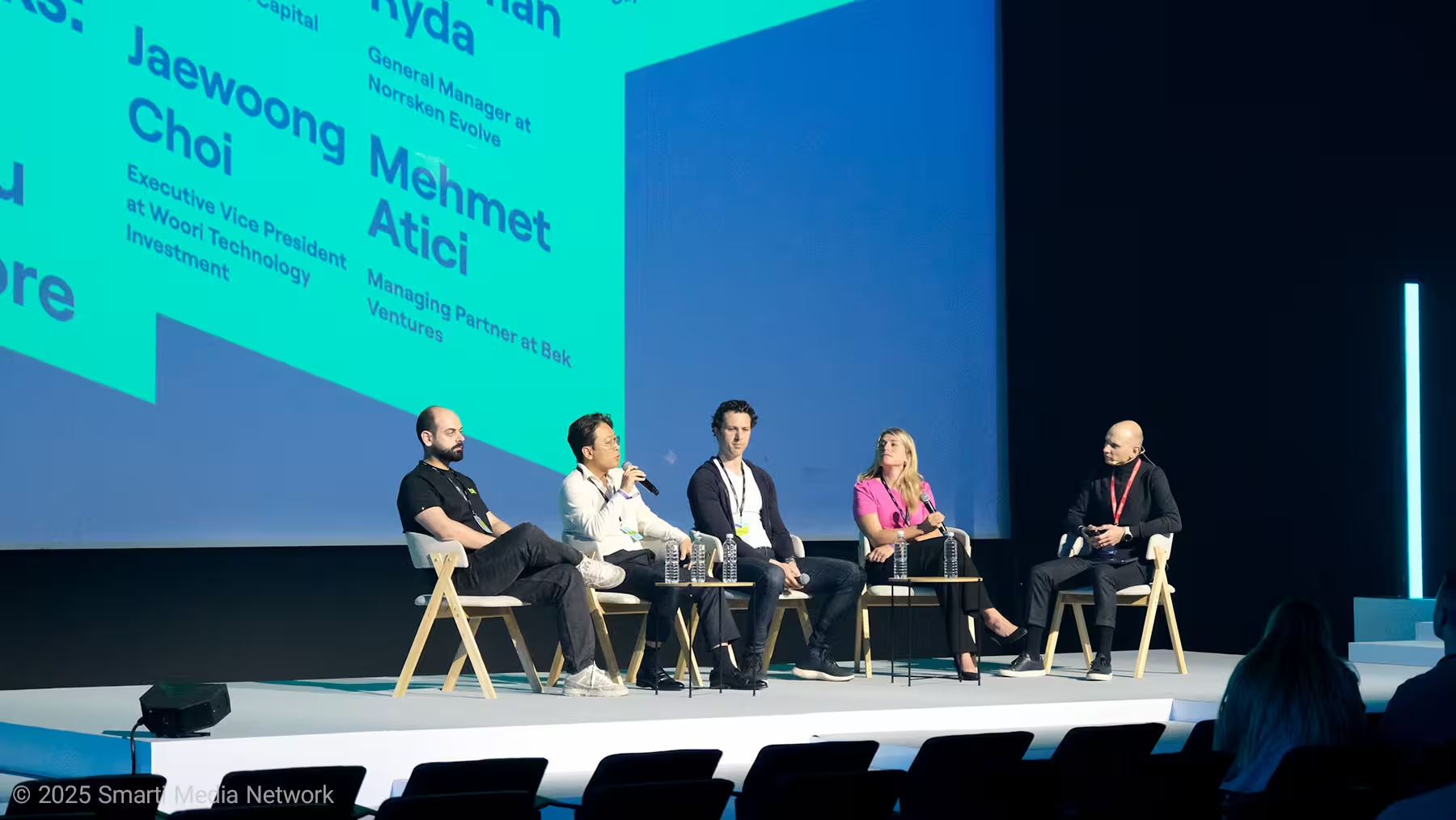
Is AI an Enabler or a Rewrite?
Keras then steered the discussion toward the big question: “AI is it an enabling technology, or a complete rewrite of how industries operate?”
Rebecka was the first to answer. “Yes, I do believe it’s a platform shift. It’s changing how we build, how we innovate it’s changing software altogether. But two things: first, is it really generating the amount of value that’s priced into the market? No, not even close. Second, are we using AI to solve the biggest problems of our time? Also no we’re building way too many sales copilots.”
She called out the current AI hype as “a massive bubble,” comparing it to crypto and the dot-com boom. “Just look at the numbers $1.5 trillion has gone into fixed assets for AI, while revenue this year, being generous, is around $50 billion. We’d need hundreds of billions to make a proper return, and we’re not seeing that.”
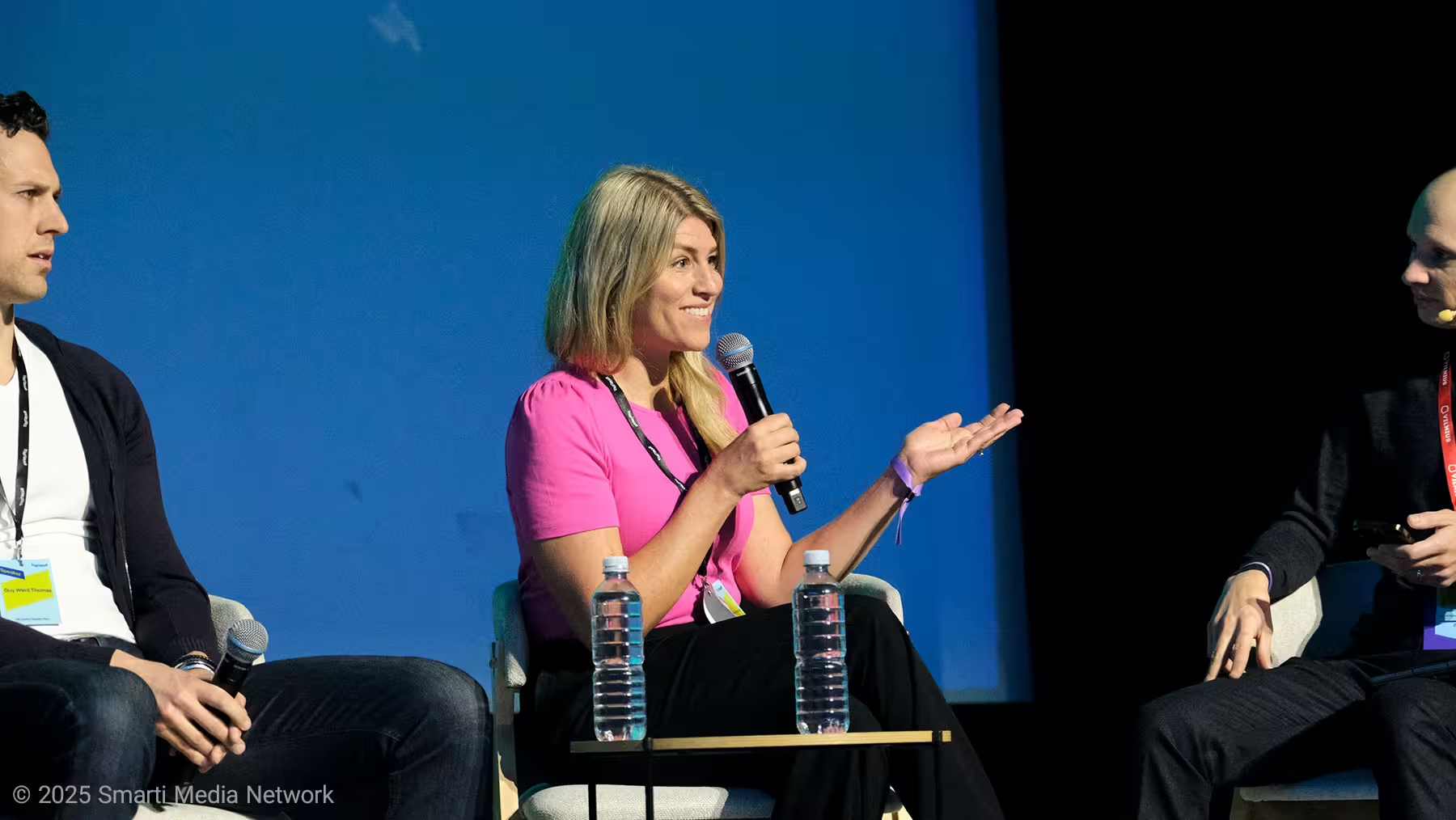
She continued: “Eighty-five percent of enterprises are not getting any value from their generative AI tools. Many of those projects aren’t even in production. Margins are thin more like marketplace margins yet these companies are valued like it’s still 2021. So yes, I think a reckoning is coming.”
Still, she ended on an optimistic note: “In the long term, I’m very positive. I think AI can truly transform industries life sciences, healthcare, energy, materials if we use it well.”
Guy Ward Thomas agreed but phrased it differently. “It’s a rewrite,” he said. “This is a platform shift. The only variable is time. The speed of transformation will vary by sector. In industries with high capital expenditure or heavy human involvement, AI will take longer to dominate. But where those moats don’t exist, we’re heading toward a full reshaping it’s just a matter of how fast.”
Jaewoong Choi described AI as a revolution that’s already here. “AI is everywhere and will be everywhere across every industry, every corner of what we’re doing. Some people might call it hype or a bubble, but it’s real. It will change everything, especially when AI meets robotics. That’s why I’m here to find the opportunities that will change the world.”
Mehmet Atici offered a contrarian view. “I agree that the hype points toward a platform shift,” he said, “but I don’t think we’re living in one yet. None of the big companies show the signals of an actual platform shift right now. Everyone is hoping to catch that moment OpenAI, Microsoft, Google but I don’t think it’s here.”
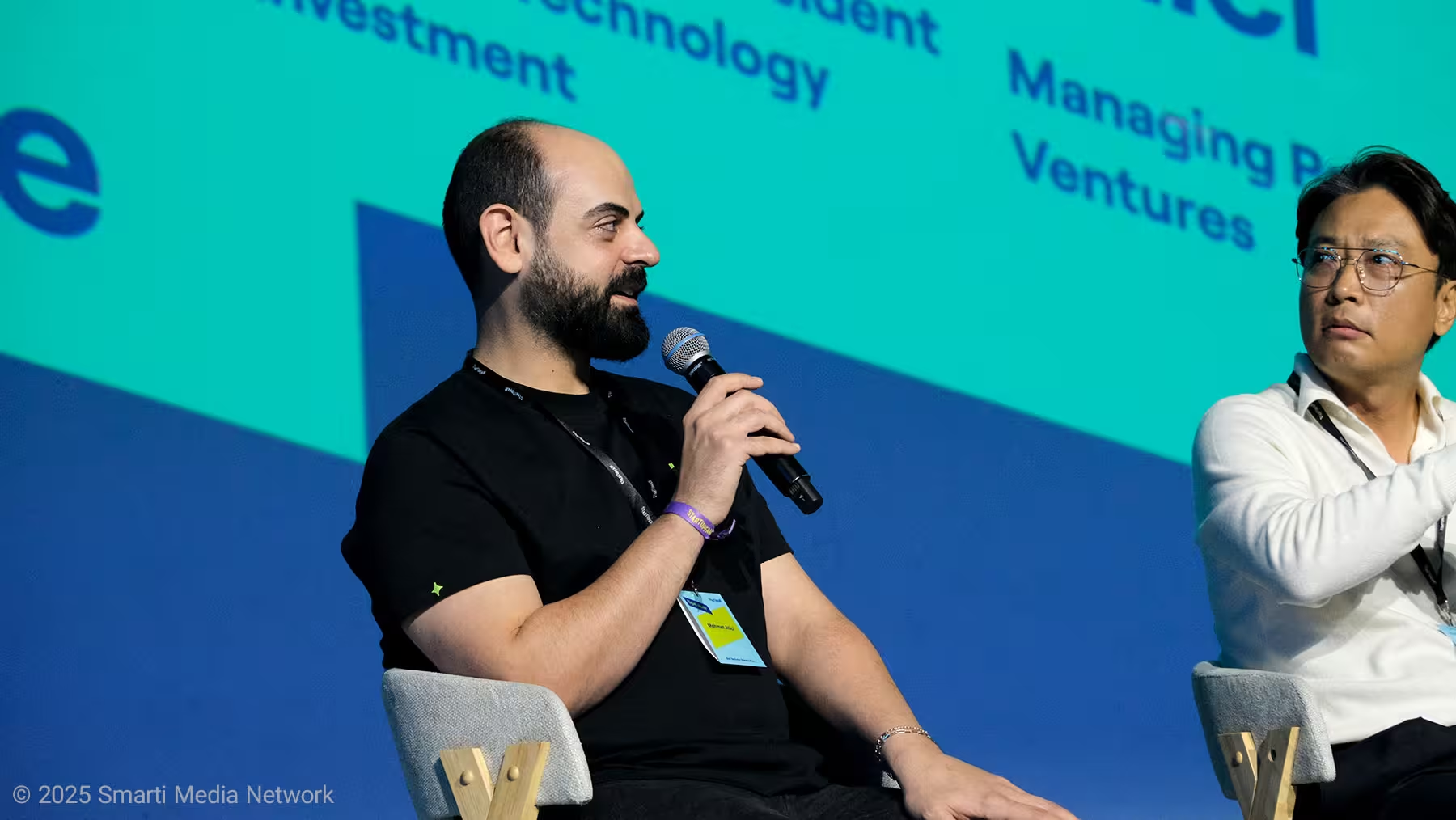
He compared AI’s current phase to the early evolution of database technology fifteen years ago. “Everyone was excited, and every company put it in their pitch decks. But fundamentally, the way they served customers didn’t change it just became another essential tool.”
“Right now,” he added, “maybe 95 to 99 percent of so-called AI companies are just using AI as a tool. Even at the research-lab level, no one has a true scaling advantage anymore. After a point, the large language models have hit diminishing returns adding more data or users isn’t giving the same edge.”
Atici pointed to the rise of efficient challengers like DeepSeek as proof that “the secret sauce doesn’t exist.” “Everyone knows it,” he said. “OpenAI, Google, Microsoft they all know. The big money is still chasing the next platform, hoping to benefit when it finally arrives. But right now, most companies are just utilizing AI, not transforming with it.”
He concluded: “We have to stay cautiously optimistic. The shift will come, but the form and timing are still uncertain.”
Growth and Metrics in AI Startups
The moderator then moved to a pressing issue for founders: traction and growth expectations. “Do we need crazy growth no matter what to get backed?” he asked.
Guy Ward Thomas said this question is now being debated in every investment committee, both in Europe and the U.S. “Benchmarks have changed,” he explained. “Investors now expect faster adoption rates, but the key is the quality of that growth.”
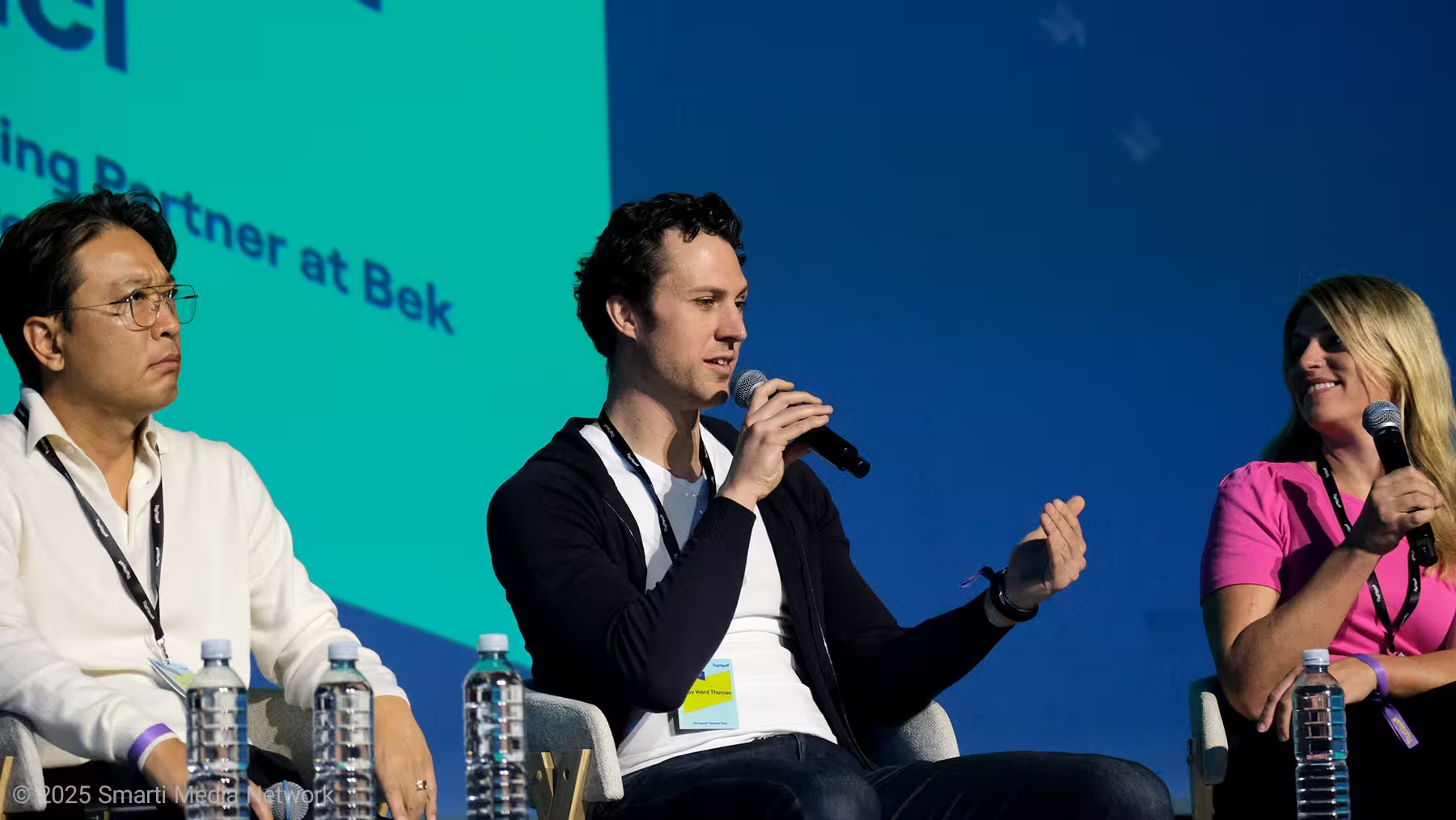
He laid out three essential signals:
“First, retention both gross and net. Second, gross margin are you selling something customers truly value, or are you just selling $20 for $10? Third, engagement and at early stages, this is the most important one. Can you point to a metric showing customers are getting real value from your product?”
“If you have those three plus revenue,” he added, “high multiples make sense. Without them, we’re in the bubble Rebecka talked about.”
Rebecka agreed and criticized the tendency to ignore margins. “Investors keep backing AI startups with awful margins, saying, ‘It’s temporary — models will get more efficient later.’ But when that efficiency comes, won’t we just build more complex products and face even tougher competition? Will margins ever really improve?”
Mehmet Atici responded: “I totally agree. In a world where the ‘secret sauce’ isn’t in the model anymore, we’re back to fundamentals. It’s like classic SaaS: how well do you solve the problem, how sticky is your solution, and how fast can you adapt?”
He added, “Some companies show strong retention simply because they have no real competitors so retention alone can be misleading. The real question is: can someone build a competitive product quickly? What’s your moat? That’s where depth, focus, and vertical specialization matter most. Vertical AI, to me, is the most promising approach right now.”
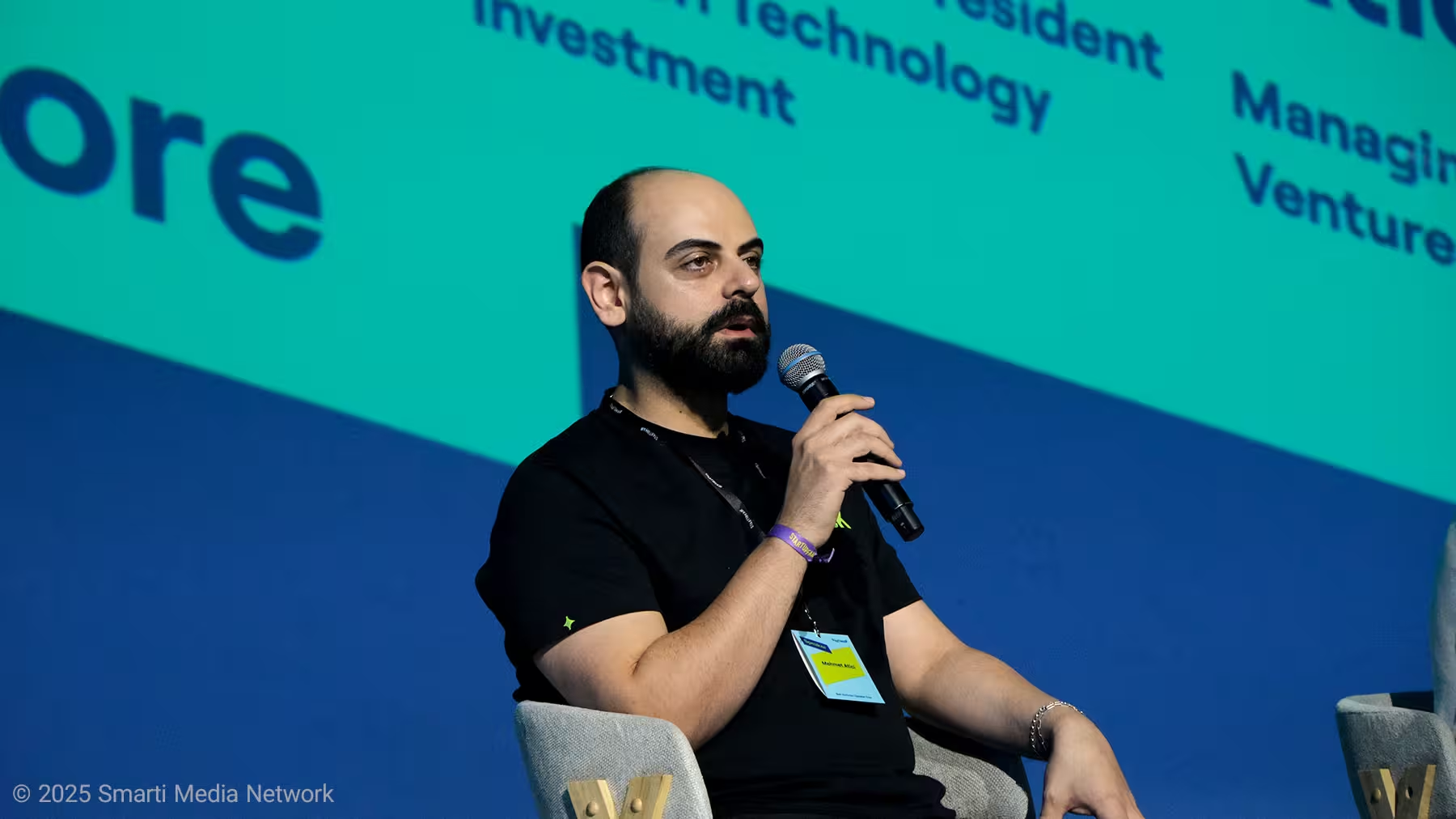
Rethinking Market Size in the Age of AI
The moderator then steered the discussion toward another crucial topic: how to define markets when AI is simultaneously shrinking some and expanding others.
Guy Ward Thomas explained that traditional software metrics no longer apply. “When you’re looking at a new business, don’t just analyze existing software spending,” he said. “You have to look at software plus labor spending, because AI ultimately replaces human work. That’s the real addressable market.”
He continued, “Your labor market, though, is not the same as your total addressable market because AI must be more efficient than people. So, there’s contraction on the labor side once automation takes over. The right way to think about market size now is task-based. Ask what each task is worth, how much efficiency AI adds, how often that task can be completed by AI, and what the penetration rate could be. Multiply those together and you have your new TAM.”
Rebecka agreed and added that her fund is open to “market maker” startups. “Some of the most successful companies of our time have created new markets,” she said. “It’s risky, but it can be transformative. We have a company building an AI software layer for batteries in midsized industrial facilities in Germany. That market doesn’t even exist yet, but it makes sense because they can reduce energy costs by fifty percent. They’re going to be the ones who create that market.”
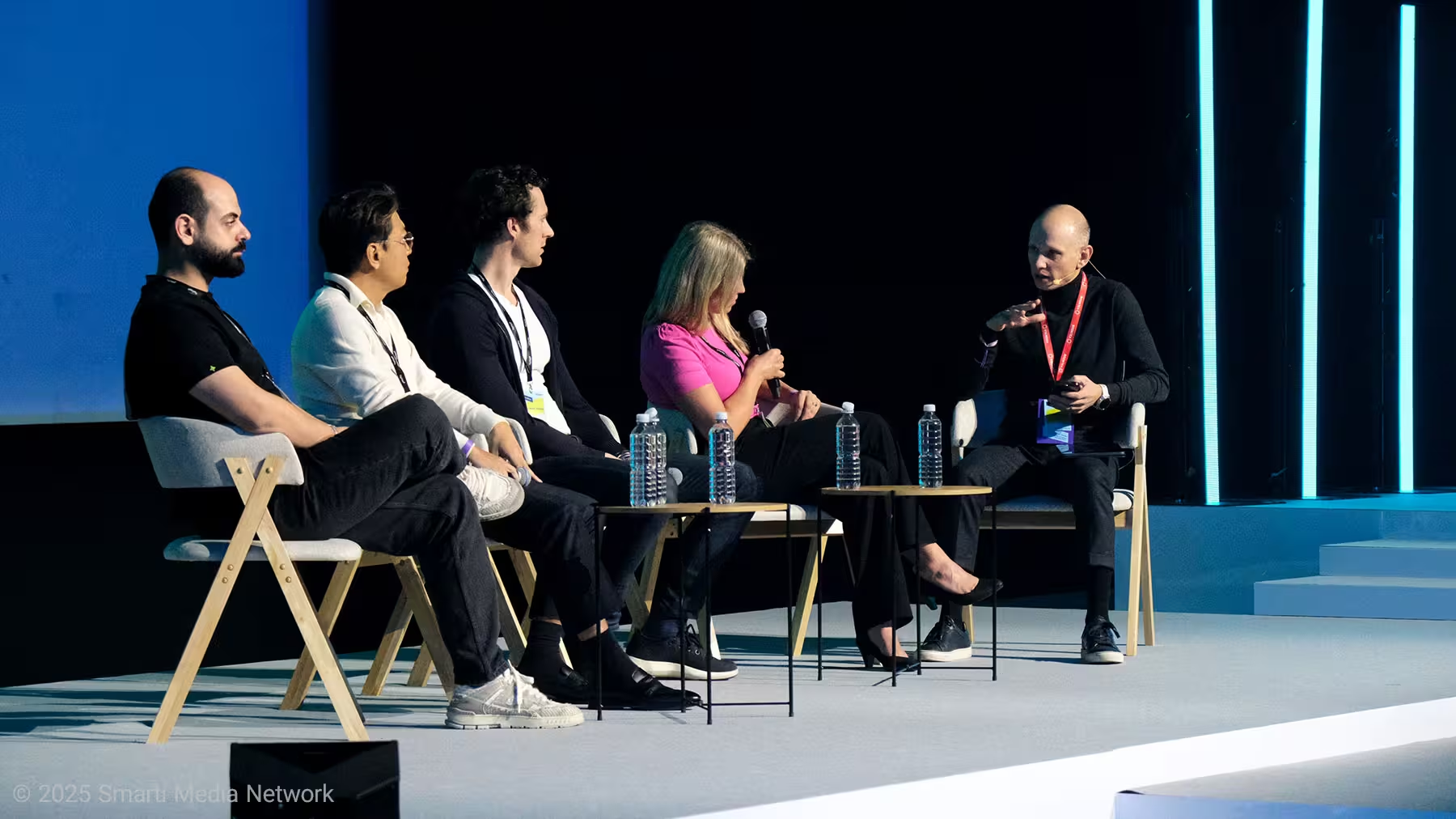
Global Competition: Europe’s Position Between the U.S. and China
The moderator then turned to Jaewoong and Mehmet, noting that the U.S. and China have clear national strategies for AI backed by trillions of dollars, while Europe’s approach remains fragmented. He asked whether Europe and the Baltics have a real chance to compete and what tactics could make that possible.
Jaewoong Choi replied that the key concept was “sovereign AI.” He broke it into three dimensions: data sovereignty, infrastructure sovereignty, and manufacturing sovereignty. “At the moment,” he said, “the United States leads, China follows closely, and Europe is still defining its position. Korea, through Naver and Kakao, is developing its own sovereign AI models as well. Without national models, countries risk losing their data sovereignty, governance, and even ethical sovereignty. Each nation needs to develop its own models and infrastructure if it wants to stay independent.”
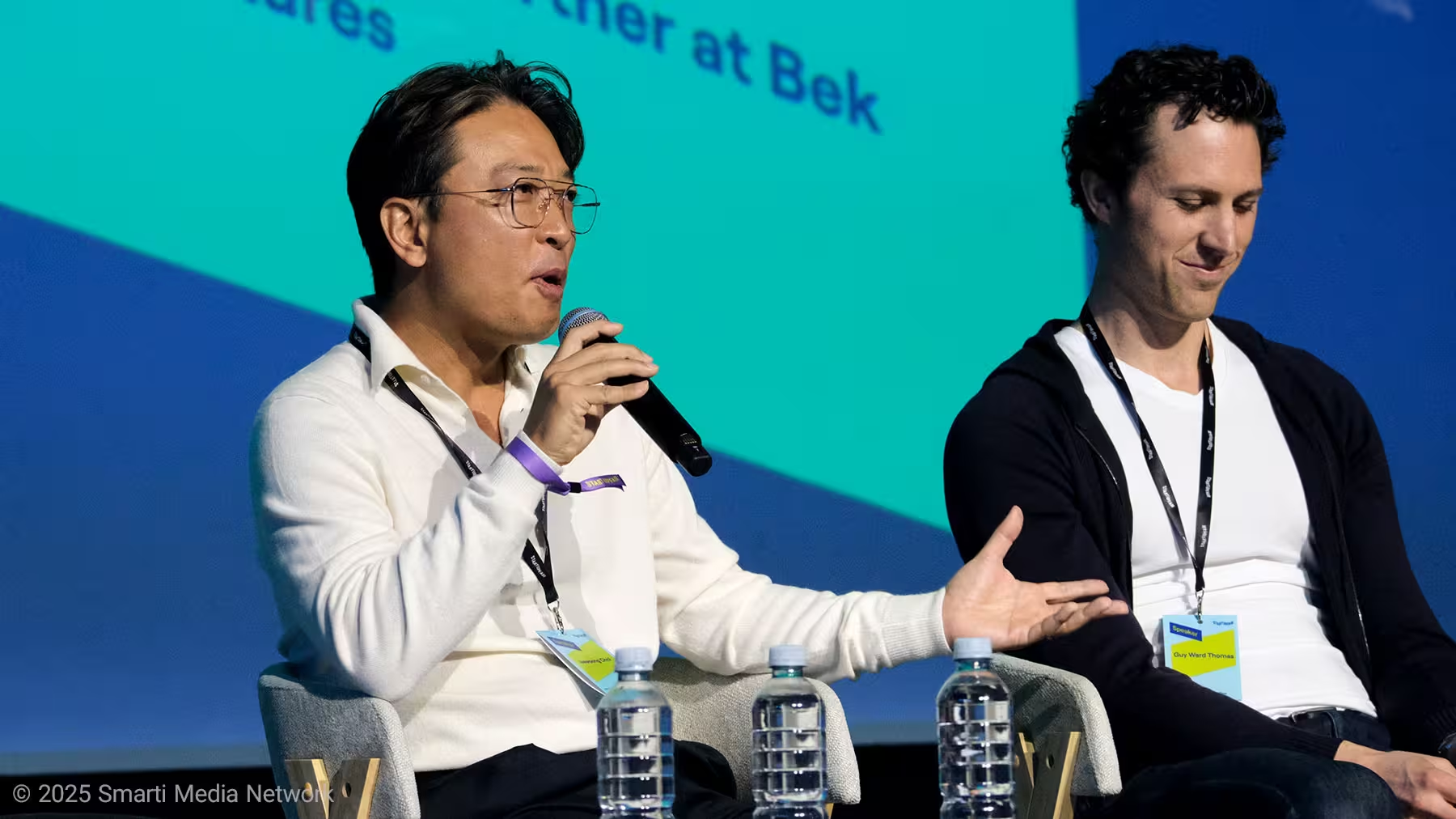
Mehmet Atici followed, offering a pragmatic view. “When we talk about AI policy,” he said, “I’m not even sure Europe wants that conversation yet. The truth is, we are significantly behind.”
He then shifted the focus. “Even if all of us VCs joined forces and pushed for a specific policy, could we really make a difference? I doubt it. So we have to think practically. Europe missed the first major software boom. Across the continent, we produced very few IPOs. When you look at Europe, you basically have SAP and UiPath as examples. Now, with AI, we finally have a second chance.”
He argued that smaller hubs like Vilnius are especially important. “When people talk about hubs, they often look at vanity metrics: number of startups, total funding, headcount. But technology is an outlier-driven business. In every ecosystem, there’s one outlier founder and one outlier team that can build a global success story. Instead of only debating sovereignty, we need to make sure we don’t miss the train again. Go global, even if it means skipping the EU as your first market. The U.S. market is at least five times larger in most software categories, and in cybersecurity, it’s twenty times larger. If you want to be a market maker, you have to build on the frontier market.”
Guy Ward Thomas jumped in to add a final point before the topic closed. “Whenever I advise my portfolio companies,” he said, “I tell them to focus on what they’re already good at, not on what they’re behind in. The U.S. and China are far ahead in foundational model development. Most European attempts to compete in that field look like vanity projects. But Europe can lead in the application layer. We are excellent at applying AI safely, with compliance and good governance. That’s where our entrepreneurial talent and capital should go — showing the world how to use AI responsibly, in a way that protects citizens and serves both customers and shareholders.”
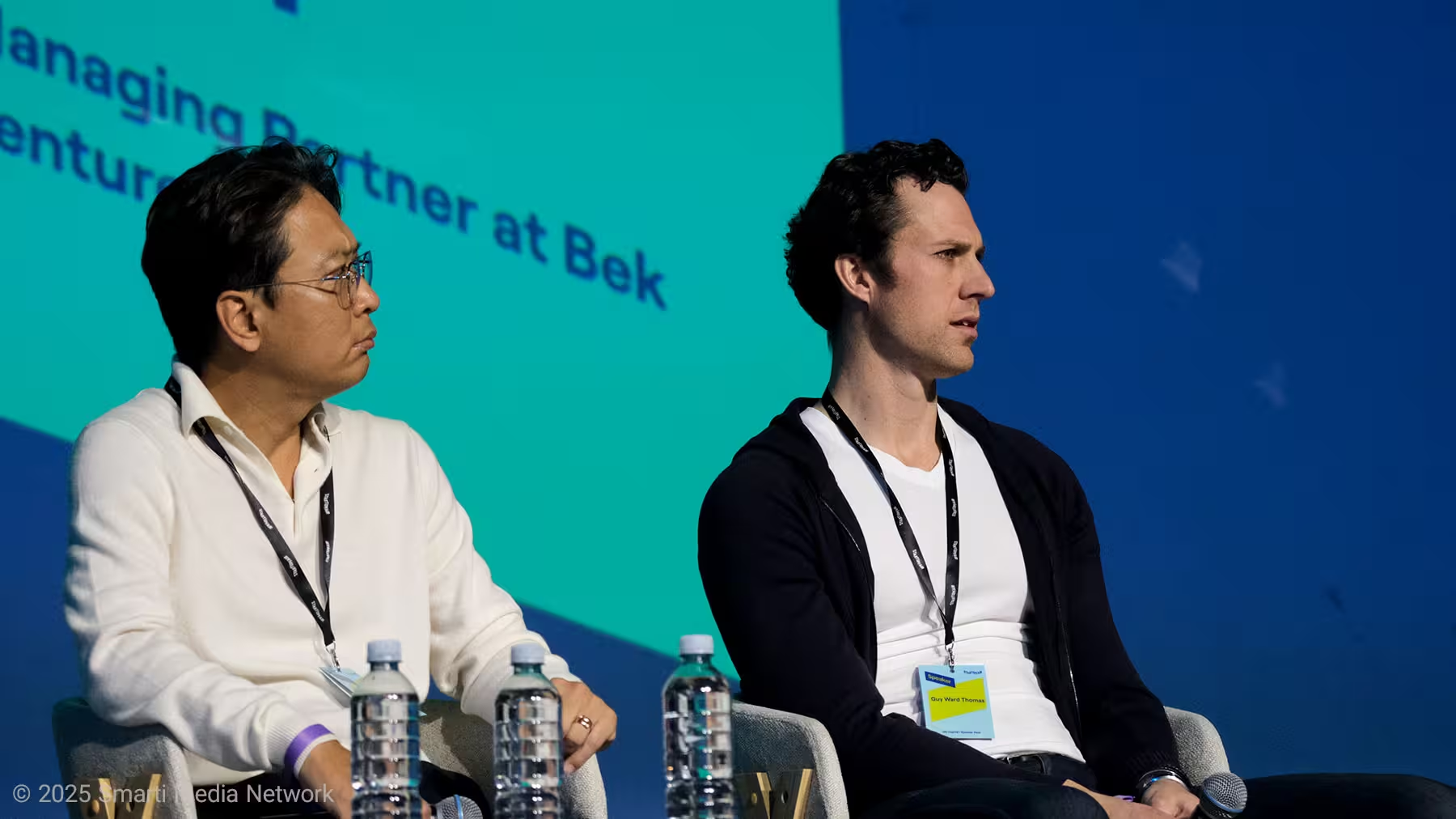
Energy and AI: The Next Bottleneck or Opportunity
With only a few minutes left, the moderator shifted to one of the biggest externalities of AI growth: energy consumption. Turning to Rebecka, he said, “AI will soon create an energy shortage. If this revolution continues, we’re going to reach grid bottlenecks. Is this a threat, or an opportunity?”
Rebecka responded immediately. “It’s a massive opportunity. Some forecasts show that by 2030 we’ll hit grid and electricity bottlenecks in parts of the world. So we need solutions — smaller, more specialized models that also address the sovereignty and security aspects Jaewoong mentioned. We need better, more efficient data centers, and a stronger AI infrastructure layer that makes usage more efficient.”
.avif)
She also warned of the Jevons Paradox. “Every time in history that technology has become more efficient, we’ve ended up using it more. That’s what makes this challenge so complex. We’ll need innovation not only in efficiency but also in how we manage demand.”
Closing Remarks
As the discussion reached its time limit, moderator Donatas Keras wrapped up. “I think it’s clear,” he said, “that we are living through a shift — maybe not yet complete, but well underway. In ten years, the list of the world’s top ten companies will probably look completely different. And OpenAI will not take everything.”
He smiled and added, “These are great times for builders and founders.”
The panelists thanked the audience as applause filled the room, marking the close of one of the most dynamic sessions of Startup Fair 2025.
Rebecka, Guy, Jaewoong, and Mehmet shook hands as the moderator concluded, “Great times for new companies to rise.”
The session ended with warm applause and an unmistakable sense that the Baltic region had firmly joined the global conversation shaping the future of technology and investment.
Comments
blocktone
Is that $1.5tn figure legit? feels like investors are pricing a future that may never arrive. who pays for all this compute?
labcore
wow didnt expect Vilnius to get this much attention, panel was fire. big questions tho are we building value or just hype?

.webp)
Leave a Comment